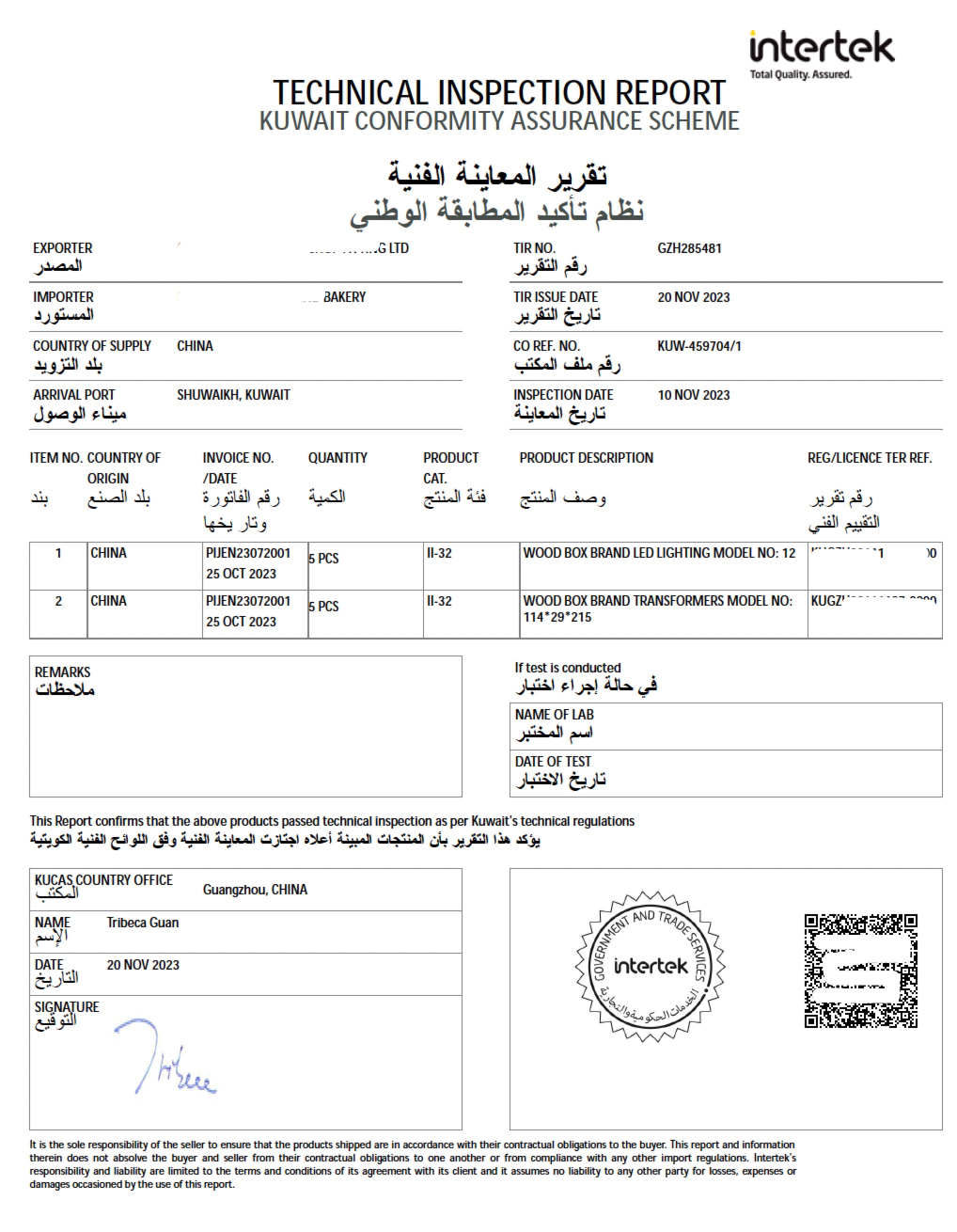COC
Export to Kuwait: TIR Certification Process, Fees, and Timeline TER
Export to Kuwait: TIR Certification Process, Fees, and Timeline

Introduction to Kuwait COC Certification
Since June 17, 2006, the Public Authority for Industry (PAI) in Kuwait has implemented the Kuwait Compliance Assurance Program. This program is a set of procedures implemented by PAI to verify whether specific products comply with technical regulations. According to this program, such technical regulations apply to both imported and domestic products. The program is implemented for specific regulated products to achieve the following objectives: Firstly, the program strengthens protection for consumers and the environment, preventing them from being harmed by dangerous, substandard, or counterfeit products.
Kuwait COC Certification Program (KUCAS):
Technical Evaluation Report (TER): Used to prove that products meet the requirements and can be exported to Kuwait. In simple terms, TER is "product registration," and after registration, a clearance quality certificate TIR can be applied for before each shipment. For products within the controlled catalog with large and frequent shipments, it is recommended to apply for TER first, which serves as the product registration certificate.
Technical Inspection Report (TIR): A mandatory document. For each batch of goods exported to Kuwait, TIR or "clearance permit documents" must be submitted. Either can be used as a prerequisite for final customs clearance.
Kuwait COC Certification Process
Step 1: Application for Certificate of Conformity
The RFC should include details of the intended imported products, which can be submitted by the importer to the institution. If the inspection application is submitted in Kuwait, electronic application materials can be sent to the institution.
Step 2: Document Review / Testing
The institution reviews whether the submitted documents comply with relevant Kuwaiti standards and conducts laboratory testing and analysis of samples when necessary.
The exporter determines the inspection date and location. Additionally, the exporter must provide documents proving that the products meet KUCAS standards, including:
Detailed Technical Evaluation Report (TER) (see below)
Any available compliance documents, such as:
• Third-party certificates conforming to international standards.
• Bulk sampling test reports conforming to international standards.
If unable to provide documents proving that the products meet KUCAS standards, the institution will sample from the shipped goods for testing or technical evaluation reports.
Step 3: Technical Evaluation Report (TER)
Obtaining TER can avoid repeated testing for each batch of products.
Exporters must provide proof of product compliance with KUCAS requirements (recent test reports, and if the product bears a certification mark, the corresponding certificate must also be provided).
The institution evaluates all information provided by the exporter to verify whether the products meet Kuwait's standards. If the information provided is insufficient, samples must be sent to the institution's designated laboratory for testing.
Once document review is passed, the institution issues a Technical Evaluation Report (TER), which can be submitted for subsequent applications.
Step 4: Inspection
Whether the goods are consistent with the description provided in the Technical Evaluation Report (TER) / compliance documents.
All goods comply with relevant standards and the description in the inspection application form (RFC).
If there are doubts about the products inspected, samples will be taken from the bulk to the designated laboratory for testing.
If the test results are non-compliant, the exporter must rectify the products, otherwise, the institution will issue a non-compliance report.
Upon receipt of a qualified inspection report, document review, and/or laboratory test results, the institution evaluates whether the shipped goods comply with KUCAS standards.
If fully compliant, the institution issues a Technical Inspection Report (TIR).
Step 5: Certificate of Conformity
The local office in Kuwait will print the Technical Inspection Report (TIR) for the importer and upload the data to the database of the Ministry of Industry (PAI).
The importer submits the Technical Inspection Report (TIR) to the Ministry of Industry (PAI) to obtain the qualified certificate required for customs clearance.
It is recommended that exporters do not ship goods until the required certificates are issued.
Kuwait COC Certification Technical Notes:
Equipment for outdoor use must undergo high-temperature testing (45°).
Nameplates must be in English and Arabic; terminal consumer goods must have instructions in both English and Arabic; the "Made in China" label must appear on the product, inner packaging, and outer packaging, all of which are required. Additionally, "Made in China" must be engraved or printed (not removable stickers) and must be present on each product and packaging.
Mandatory frequency requirement: 50 HZ; Applicable voltage: 230 V, 240 V
Special requirements for plugs and sockets: Must be British triangular plugs, compliant with BS1363 or BS546 standards.
Electronic and electrical products must display voltage and frequency on the product label.
Product graphics and text must not contain offensive language or images related to Islam.
Documents Required for Kuwait COC Certification:
Packing list: Packing List
Proforma invoice: Proforma Invoice
Product testing reports: Must be issued by qualified third-party testing agencies, and products with valid testing reports do not need to be retested.
CoC Application Form RFC: Blank application forms are provided by the handling institution.
Fees, Prices, and Timeline for Kuwait COC Certification:
The prices and fees for different product certification standards and projects vary。
Kuwait Import documents include
Kuwait documentation procedures require a commercial invoice, certificate of origin, packing list, and a bill of lading or airway bill to accompany all commercial shipments. Certain products may require additional licenses or certificates.
Kuwait Import Tariffs
Kuwait officially approved the Single Customs Tariff on April 1, 2003, thereby setting a 5% import duty (CIF) on most goods. Exempt from the Single Customs Tariff are certain basic foodstuffs and medicines or medical items, which are duty free. Tobacco products are assessed a 100% duty
Contact Information:
Rich Tel: 0755-26996194 Phone&Whatsapp:13530227809
rockycho.sz@gmail.com
____END____
CATEGORIES
ECTN BESC
- China srrc certification application pro2018-08-08
CONTACT US
Contact: COC certificate,pvoc,coi,ectn,besc
Phone: 13641409693
Tel: +86-755-23763628
E-mail: rockychou.sz@gmail.com
Add: Room 2401, Building A, Jingji 100, Shennan East Road, Luohu District, Shenzhen City, Guangdong Province,China
